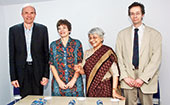 |
| (From left) Eric Clarke, Sally Shuttleworth, Aditi Lahiri and Edmund Herzig at the interactive session at the British Council. (Picture by Bishwarup Dutta) |
An interactive session with four distinguished Oxford scholars on the relevance of the humanities was held recently at the British Council.
The scholars at “Oxford Thinking: The Campaign for The University of Oxford” were Sally Shuttleworth, the head of the humanities division at Oxford University; Eric Clarke, the Heather Professor of Music at the university since 2007; Edmund Herzig, a Soudavar Professor of Persian Studies; and Aditi Lahiri, who holds the chair of the faculty of linguistics, philology and phonetics.
Lahiri, from Calcutta, is the first Indian woman to hold a chair at Oxford.
Shuttleworth made it clear at the beginning that her academic delegation had travelled to India to spread the word of the humanities, and to reassert its aesthetic and educational relevance in the lives of people.
She spoke of the rapid movement away from the humanities in Europe and America and expressed a wish to counter the trend. Speaking of the various departments in the Humanities division, such as English literature, history, oriental studies and theology, she highlighted the university’s emphasis on studying and exploring the histories and cultures of the world.
Clarke offered an interesting view of the department of music at Oxford when he spoke of the consolidated research methods employed in imparting to the students a thorough knowledge and skill of composing and performing music.
He mentioned that apart from classical music and its history — from medieval times to the contemporary age — the department also sought to explore the psychology of performance and listening, as well as the perception and production of rhythmic patterns in music.
Herzig, from the department of history, spoke of the university’s “exemplary” balance between the passionate, individual drive of its scholars and their collective interest in the world beyond their specific areas of specialisation. A distinctive characteristic about the department, he said, is that the students must learn the languages of the cultures that they study to gain an in-depth knowledge about their subjects.
Lahiri spoke of her faculty, which is relatively new in a university that is the oldest in the United Kingdom, and said the study of linguistics at Oxford had come a long way from being restricted to etymology, looking at texts and their deconstruction. Shuttleworth and Lahiri spoke of the rising pressure on children that has been created by a faulty tutorial system, where children are inundated with information and not knowledge.
The four visiting scholars spoke of a crucial factor in higher education that often led to Indian students opting for the US instead of the UK — funding. Lahiri said the university was hoping to build up on scholarship endowments to encourage bright students to opt for the humanities.
The Oxford Thinking campaign, the biggest fundraising campaign in the history of Europe, aims to raise a minimum of £1.25 billion for the university.











